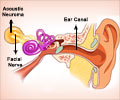
Research in the weightlessness of space offers unique insight into genetic and cellular processes that simply can't be duplicated on Earth, even in simulated microgravity. "Microgravity can be approximated on Earth, but we know from the literature that simulated microgravity isn't the same as the real thing," says Daniela Gabriele Grimm, M.D., a researcher with the Department of Biomedicine, Pharmacology at Aarhus University in Aarhus, Denmark, and an author of the FASEB paper.
True weightlessness affects human cells in a number of ways. For one thing, cells grown in space arrange themselves into three-dimensional groupings, or aggregates, that more closely resemble what happens in the body. "Without gravitational pull, cells form three-dimensional aggregates, or spheroids," Grimm explains. "Spheroids from cancer cells share many similarities with metastases, the cancer cells which spread throughout the body." Determining the molecular mechanisms behind spheroid formation might therefore improve our understanding of how cancer spreads.
Source-Eurekalert










